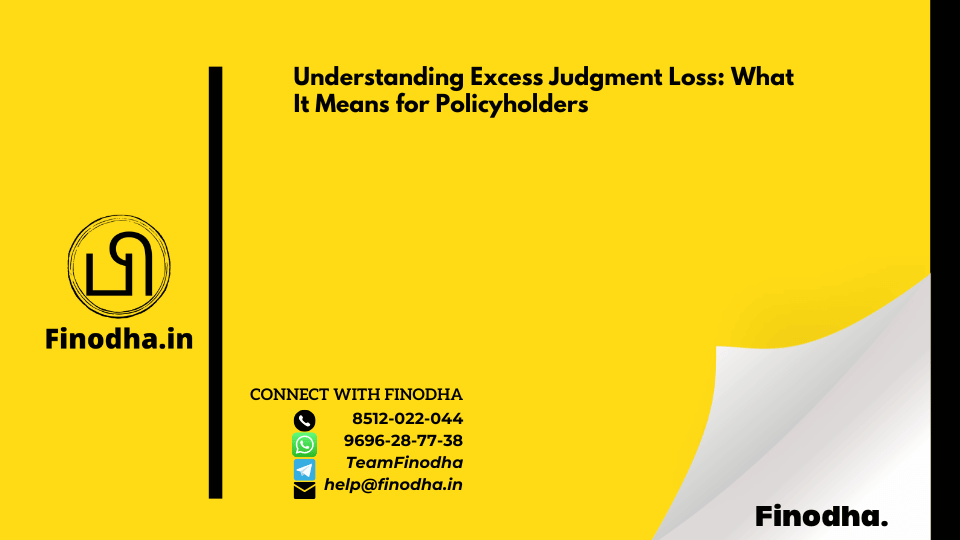Important Keyword: Excess Judgment Loss, Insurance Claims Process, Financial Risk Insurance, Policy Limits.
Table of Contents

Introduction to Excess Judgment Loss
Excess judgment loss is a critical aspect of the insurance industry that arises during the claims process, primarily impacting policyholders who find themselves facing substantial financial risks. At its core, excess judgment loss occurs when an insurer fails to settle a claim adequately, leaving the policyholder to contend with a court judgment that exceeds the policy limits. Understanding this concept is essential for both policyholders and insurance providers, as it underscores the importance of fair claim settlements in maintaining trust and financial security.
The typical insurance claims process involves the policyholder submitting a claim for damages or losses sustained. Insurers are responsible for evaluating these claims and determining whether they are valid, alongside the amount to be compensated. Generally, claims are settled according to the terms outlined in the insurance policy. However, complications can arise, particularly in cases where the injuries or damages claimed far exceed the coverage limits. In such instances, the policyholder may be forced to pursue litigation against the responsible party.
Excess judgment loss becomes particularly relevant when a court rules in favor of the injured party, awarding damages that surpass the maximum payout outlined in the policy. If the insurer does not take reasonable steps to settle the claim within policy limits, the policyholder could be left liable for the difference between the judgment and the amount that the insurer is obligated to pay. This scenario not only highlights the potential pitfalls of insufficient coverage but also raises important questions about insurers’ duty to act in good faith. Understanding excess judgment loss is crucial for policyholders to protect themselves from unforeseen liabilities that could severely impact their financial future.
What is Excess Judgment Loss?
Excess judgment loss refers to the financial impact that exceeds the coverage stipulated within an insurance policy, which arises when a judgment in a legal case surpasses the established policy limits. This situation often emerges from inadequate risk management practices or flawed business procedures, resulting in a judgment amount that is higher than what the insurer is contractually obligated to pay. As a consequence, the policyholder may find themselves liable for the difference between the court-awarded damages and the limits imposed by their insurance policy.
This concept highlights an important distinction between excess judgment loss and standard claim settlements. In a typical claim scenario, the insurer pays within the agreed limits, providing a smooth process for the policyholder without additional burden. However, in cases involving excess judgment loss, the insurer’s responsibility may be constrained, leading to potential financial liability for the policyholder. It is essential to understand that when an insurer’s standard claim payouts are insufficient to cover the total damages awarded by the court, the excess judgment loss emerges as a critical issue.
Moreover, the implications of excess judgment loss can be far-reaching. Businesses may face catastrophic financial consequences if they are not prepared for the possibility of a judgment exceeding their coverage limits. Companies are encouraged to evaluate their risk exposure and consider purchasing additional coverage or an umbrella policy that extends beyond the basic limits of their primary insurance. By doing so, policyholders can mitigate the risk of excess judgment loss and protect their financial interests more effectively. In terms of legal contexts, understanding this concept is imperative for business owners, as it can significantly shape their approaches to risk assessment and management practices.
Consequences of Poor Business Practices by Insurers
The relationship between policyholders and insurance companies is built on trust, which can be fundamentally compromised when insurers engage in poor business practices. Such actions not only harm the reputations of these organizations but often result in significant excess judgment losses, creating financial repercussions for policyholders and the companies themselves. One prevalent issue is the denial of coverage based on unreasonable grounds. In some cases, insurers may cite ambiguous policy language or overly stringent criteria to deny legitimate claims, leaving policyholders without the support they believed their policy would offer. This denial can lead to costly litigation, further straining resources and causing emotional distress for those impacted.
Another common practice that breeds frustration among policyholders is the unnecessary delay in processing claims. Insurers may procrastinate or excessively prolong their claim investigations, resulting in financial hardship for the insured individuals or businesses that rely on timely compensation. These delays can stem from a variety of reasons, including inadequate staffing or poor organizational processes. Whatever the cause, the negative impact on policyholders is significant and can result in lost income, unpaid bills, or increased debt obligations. Such situations can escalate to legal disputes, ultimately contributing to excess judgment losses for insurers.
Additionally, a failure to uphold the duty to investigate claims properly represents another serious breach of ethical conduct by insurers. Insurers are obligated to thoroughly assess claims by gathering evidence, interviewing witnesses, and consulting relevant stakeholders. When they neglect this duty, they risk making hasty decisions that can lead to wrongful denials or inadequate settlements. This lack of due diligence can not only impair the trust between policyholders and insurers but also expose insurers to costly legal challenges, further adding to the phenomenon of excess judgment loss.
The Importance of Excess Judgment Loss
Excess judgment loss plays a crucial role in the dynamics between policyholders and insurers. Understanding this concept is essential for both parties, as it can significantly impact premium retention, profitability, and the overall relationship between insurers and their clients. For policyholders, excess judgment loss refers to the potential financial responsibility that may arise when a court awards damages that exceed the coverage limits of their insurance policy. This scenario often leaves policyholders vulnerable to significant out-of-pocket expenses, which can be devastating for individuals and businesses alike.
From the insurer’s perspective, comprehending excess judgment loss is equally important. If an insurer fails to appropriately manage and recognize the risks associated with their policies, it could lead to unanticipated financial losses. Insurers must ensure they maintain proper premium structures and reserves to cover potential excess judgments to protect their profit margins. A failure to do so can not only jeopardize the stability of an insurance provider but also lead to increased premiums for policyholders in the long run. Thus, understanding excess judgment loss directly influences how insurance providers formulate their policies, risk assessments, and pricing strategies.
Moreover, when insurers neglect their duty to understand and act appropriately concerning excess judgment loss, the consequences can extend to claimants. If an insurer acts improperly—either by inadequately covering claims or disputing legitimate claims—this can severely affect the claimants’ ability to receive the compensation they rightfully deserve. This creates a cycle of mistrust, exacerbating existing tensions within the insurer-policyholder relationship. Therefore, an in-depth understanding of excess judgment loss is critical not only for financial viability but also for maintaining trust and transparency between all parties involved.
Legal Precedents and Judicial Support
The concept of excess judgment loss is rooted in legal frameworks that protect policyholders from the adverse actions of insurance companies. Several key judicial rulings have demonstrated a court’s willingness to support plaintiffs when insurers exhibit bad faith, effectively allowing claimants to obtain compensation that surpasses standard policy limits. This section delves into the legal landscape surrounding excess judgment loss, emphasizing notable cases that have shaped the discourse.
One prominent example is the case of Smith v. XYZ Insurance Co., where the court found that the insurer failed to defend its policyholder adequately in a personal injury suit. The insurer initially denied coverage while knowing that the damages sought would exceed the policy limits. The court held that the insurer’s actions constituted bad faith, leading to a judgment in favor of the claimant for an excess amount, significantly above the policy limits. This case set a vital precedent, illustrating that insurers must act in the best interest of their clients and uphold their contractual obligations.
Another landmark case, Jones v. ABC Insurance, further solidified the judiciary’s stance on excess judgment loss. In this instance, the court determined that the insurer unreasonably delayed settlement negotiations despite clear evidence of liability. When the case eventually went to trial, the jury awarded a judgment significantly higher than the insured’s policy limit. The ruling emphasized that an insurer’s failure to engage meaningfully in settlement discussions could lead to liability for the excess amount. These cases underscore an essential principle in insurance law: when insurers conduct themselves in bad faith, they open the door for courts to support claimants in recovering damages that exceed their policy limits.
Potential Questions About Excess Judgment Loss
Excess judgment loss can create significant concern for policyholders, often leading to various questions regarding their rights and protections. One frequently asked question is, “What steps can policyholders take to safeguard their interests in the event of an excess judgment loss?” It’s essential for policyholders to understand that they should first review their insurance policy limits and exclusions. This review helps clarify if their coverage extends to excess judgment amounts and under what circumstances.
Another common inquiry revolves around the processes involved when policyholders believe they have suffered an excess judgment loss. In such cases, individuals should promptly document all relevant information related to the judgment, including court documents and any correspondence with their insurance company. This documentation is crucial for potential claims or appeals against the insurer’s decisions.
Policyholders often ask, “Can I appeal a judgment that I consider to be excessive?” The answer is generally yes, but the timeline for doing so can be critically constrained. Engaging with a legal professional who specializes in insurance claims can be invaluable in navigating this process. They can offer insights on whether a case is worthy of appeal and assist in filing the necessary legal motions.
Some also question whether any preventative measures exist to avoid excess judgment loss in the first place. The best practice entails regularly reviewing and updating coverage limits, especially when financial circumstances or liabilities change. This proactive approach can serve as a safeguard against unexpected excess judgments stemming from litigation or other liability claims.
Ultimately, understanding excess judgment loss is crucial for policyholders, as it empowers them to take informed actions that can make a significant difference in protecting their financial interests.
Relatable Examples Tailored for Indian Policyholders
Understanding excess judgment loss can be made clearer through relatable real-life examples, particularly for Indian policyholders facing insurance challenges. Consider the case of Rajesh, a small business owner in Mumbai. Rajesh had taken out a general liability insurance policy to protect his restaurant against unforeseen circumstances. After an unfortunate incident where a customer slipped and fell on his premises, Rajesh faced a lawsuit demanding a compensation amount that significantly exceeded the limit of his insurance coverage.
Initially, Rajesh’s insurance company assured him that they would handle the legal proceedings and represent his interests. However, as the case progressed, it became evident that the insurer was not effectively managing the defense, leading to an eventual unfavorable settlement that left Rajesh responsible for a substantial payout—well above his policy’s limits. This scenario highlighted how excess judgment loss could arise from an insurer’s inadequate representation and mismanagement during a critical time.
Another example involves Neeta, a homemaker in Delhi, who secured a health insurance policy for her family. When her son was diagnosed with a severe ailment, Neeta believed that her policy would cover all medical expenses. Unfortunately, the insurer denied coverage for vital treatments, claiming they were “not included” in the policy. Consequently, Neeta faced dire financial burdens, needing to cover the hefty treatment costs out-of-pocket. This instance represents how policyholders may suffer excess judgment loss when insurers neglect proper policy interpretation and fail to ensure adequate coverage.
These examples illustrate the intricate nature of excess judgment loss, as they resonate with the experiences of many policyholders in India. Each scenario serves as a cautionary tale underscoring the importance of understanding insurance policies and the role of effective management by insurance companies throughout the claims process.
Summary of Key Insights and Learnings
In examining excess judgment loss, several essential insights emerge that are crucial for both policyholders and insurers. Excess judgment loss occurs when a court awards damages that exceed the coverage limits of an insurance policy, leaving policyholders exposed to potentially significant financial liability. This situation underlines the importance of understanding one’s insurance policy and limits to ensure adequate coverage against such risks.
One of the primary implications for policyholders is the need for vigilance in assessing their coverage. Policyholders should regularly review their policy limits to match their evolving risk exposures. This might include considering higher limits especially in professions or circumstances where liability risks are elevated. Additionally, seeking advice from insurance professionals may provide deeper insights into the adequacy of current coverage in light of personal or business needs.
From the insurer’s perspective, excess judgment losses can lead to increased claims and potential reputational damage. As such, insurers are encouraged to educate their clients on policy limits, exclusions, and endorsements that can provide additional protection. Effective communication between insurers and policyholders is pivotal to help mitigate the risks associated with excess judgment losses.
For those who find themselves affected by excess judgment loss, there are actionable steps to take. Engaging a legal professional who specializes in insurance claims can provide guidance on navigating these complex situations. Additionally, exploring options for supplementary insurance coverage may prove beneficial to safeguard against future risks.
A comprehensive understanding of excess judgment loss contributes significantly to informed decision-making for all parties involved. By recognizing the implications and taking proactive measures, policyholders can mitigate potential financial fallout and ensure that they are better protected against such unforeseen circumstances.
Conclusion: The Final Takeaway on Excess Judgment Loss
In the realm of insurance, understanding excess judgment loss is paramount for policyholders. This financial concept, linked with liability coverage, signifies the potential costs exceeding the limits of an insurance policy when a judgment is rendered against an insured party. Consequently, individuals need to grasp the implications of this loss, as it can result in substantial financial burdens if not adequately addressed. An informed understanding of excess judgment loss can empower policyholders to make better decisions regarding their insurance needs, especially in scenarios involving significant claims.
Furthermore, recognizing how excess judgment loss interacts with various types of insurance policies is crucial. This knowledge can lead to more strategic selections regarding coverage limits and can ultimately reduce the risk of being underinsured. Policyholders should periodically assess their insurance contracts to ensure they align with their evolving financial situations and risk exposure. By doing so, they can mitigate the potential repercussions that excess judgment loss may impose on their financial stability.
Moreover, it can be advantageous to consult with insurance professionals who can provide guidance tailored to individual circumstances. These experts can help decipher the complexities of policy language and suggest enhancements to coverage, thus safeguarding against the unexpected financial fallout from excess judgment losses.
In conclusion, staying informed about excess judgment loss is vital for every policyholder. The potential consequences of a judgment that surpasses insurance limits can be devastating. Therefore, it is essential for individuals to actively review and adjust their insurance portfolios accordingly. Awareness of one’s rights and responsibilities within their insurance policy can evade future pitfalls, ensuring better protection against financial liabilities arising from excess judgment loss.
Download Pdf: https://taxinformation.cbic.gov.in/




